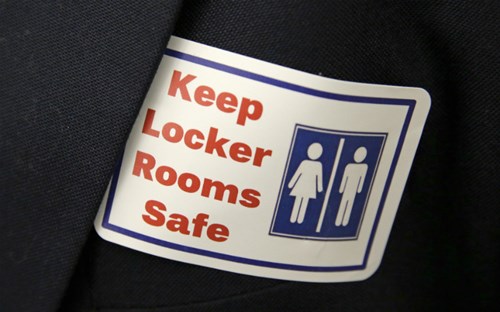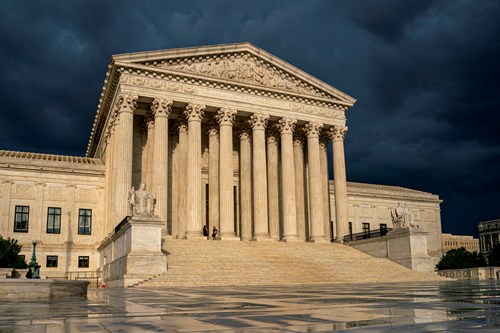The Court on Friday rejected a request by the Biden administration that most of its radical rewrite of 1972’s landmark legislation for women’s rights be allowed to take effect while appeals continue.
The ruling means injunctions awarded at the appeals court level will bar the administration from enforcing any part of its new Title IX. The administration had specifically asked that it be allowed to enforce three provisions dealing with what it called discrimination against transgenders, according to Amy Howe, a journalist who regularly covers the Court.
 While the ruling protects students, it also protects school districts from losing federal money for non-compliance.
While the ruling protects students, it also protects school districts from losing federal money for non-compliance.
While the justices seemed united in their opinion that girls deserved protection from biological males competing on their sports teams and entering their locker rooms and other safe spaces, they were divided on the issue of whether the entire rewrite should be blocked – hence the 5-4 final vote.
Dissenting Justices Sonia Sotomayor, Elena Kaga, Neil Gorsuch and Ketanji Brown Jackson called the lower courts’ orders “overbroad,” Howe wrote.
A big win for the good guys
Matt Sharp, the Alliance Defending Freedom attorney working the case, called it a big win.

“We’ve seen for years now the Biden-Harris administration with its dangerous rewriting of Title IX how it undermines opportunities for women, impacts fairness in sports and harms girls’ privacy and safety," Sharp said on the Washington Watch program.
"We’ve had 22 states that have gotten injunctions against this, and to see the Supreme Court uphold and allow those injunctions to keep it from going into effect in these ten states is a big win for women and people everywhere who are concerned about the radical gender ideology that’s being pushed by the Biden-Harris administration.”
ADF is representing a female athlete, a group of Christian teachers, and a Louisiana school board in these lawsuits.
The Court ruled on two separate challenges last week – one filed in Kentucky that represented six states, the other filed in Louisiana that included four states.
Other actions playing out at lower levels in other districts brings the total number of states to 26 that will be spared the mandated implementation of the new Title IX, according to Education Week.
The Court’s action still leaves a confusing and disjointed map for where the regulation is in effect. The administration sought an Aug. 1 effective date for the entire country.
Injunctions aren’t permanent. The fate of the Biden administration’s radical rewrite will likely return to the Supreme Court.
One injunction that wasn’t heard by the Court last week was issued by a federal judge in Kansas. It blocked the new Title IX in four states but also at any school across the country attended by students whose parents are members of three groups who joined the challenge: Moms for Liberty, Young America’s Foundation, and Female Athletes United.
Speaking of overreach
 The dissenting justices claim of overreach by the lower courts is interesting given the context of what the administration is trying to accomplish.
The dissenting justices claim of overreach by the lower courts is interesting given the context of what the administration is trying to accomplish.
“The big takeaway is we’re seeing time and time again as courts are looking at this, they’re ruling that the Biden-Harris administration’s rewrite of Title IX went far beyond the law," Sharp told show host Jody Hice.
"They don’t have the authority to override Congress when Congress wrote this decades ago trying to create equal opportunities for women – and here’s the Biden-Harris administration saying, 'You know what, we’re going to co-opt that law, and we’re going to use it to push radical gender ideology on schools across the country.'
"We’re hopeful that ultimately the Supreme Court will agree and strike down this rule in its entirety,” Sharp added.
Another round with the Supreme Court could come sooner rather than later. “These cases are still moving along. I know with the Tennessee and Kentucky cases they’re scheduled for an expedited argument here pretty soon,” said the ADF attorney.
And Sharp argued the Supreme Court’s recent action and other lower-court rulings bring much-needed clarity and confidence for teachers and administrators.
“They don’t have to follow this unlawful Biden-Harris rewrite of Title IX and can continue to put their students’ safety and privacy and the fairness for young women in sports at the forefront of their policies as they’re heading into the school year,” he explained.
The injunctions are the “stop gap” that makes sure as students return to schools that a daughter “won’t walk into her locker room to find a guy sitting there as she’s getting dressed for class or a young boy may not be forced to use an inaccurate name or pronoun,” Sharp said.
Don’t be confused by 5-4 final vote
Sharp called the ruling a huge victory for common sense, equal opportunities for women, and the rule of law. And he contends there’s more strength in the ruling than a 5-4 vote implies.
“There was a little quibbling where we had that 5-4 split as to whether this should apply only to those specific parts of Title IX or to the entire rule itself," he stated. "The real thing people need to take hold of is all nine justices said we’re going to allow these injunctions in these ten states. All nine justices agreed to let those injunctions stay on the books while these cases move forward.”







